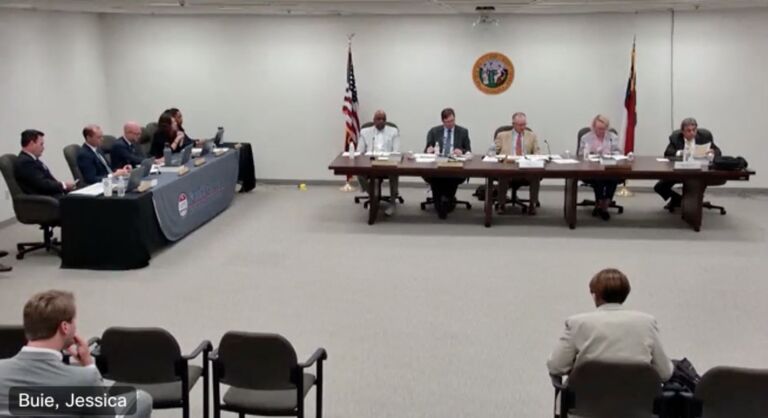Elections board seeks Dec. 1 resolution of congressional map dispute

The North Carolina State Board of Elections needs to have legal issues surrounding a new congressional election map finalized by Dec. 1 to avoid administrative delays for 2026. That’s according to a federal court filing Friday.
The elections board indicated that it takes no position on the impact of the new map on two ongoing consolidated federal redistricting lawsuits. Nor does the board take a position on redistricting plaintiffs’ request to add the new map to the existing court dispute.
“As the State Board has previously stated in this case, if changes to the current district maps are made as a result of this litigation, the impact on the elections calendar will depend on the scope and timing of such an order,” the board’s lawyers wrote. “To accommodate changes to the current maps without delaying any administrative dates or deadlines for ballot preparation and distribution for the March 2026 primary, the State Board would need to receive the new map by December 1, 2025, which is approximately six weeks (38-42 days) before absentee voting is set to begin for the March 2026 primary.”
Plaintiffs working with Democratic operative Marc Elias’ law firm filed paperwork Thursday to challenge the map one day after it cleared the state legislature.
A three-judge panel held a trial this summer in two consolidated cases challenging North Carolina’s 2023 congressional and legislative election maps. That panel has not yet issued a ruling in the case.
Plaintiffs in one of the suits, identified now as Williams v. Blackwell, are asking the judges’ permission to file a supplemental complaint. That 47-page document challenges the congressional map the Republican-led General Assembly approved this week with Senate Bill 249.
State legislative leaders defending the congressional map “do not oppose” the motion for a supplemental complaint, according to the court filing.
“Over the course of just over 48 hours, the North Carolina General Assembly enacted the state’s fifth congressional plan in four years — an unnecessary, mid-decade redistricting that targets a historic Black opportunity district that has elected a Black representative to Congress for more than 30 years,” the proposed supplemental complaint argued.
“North Carolina gained a congressional district after the 2020 Census, almost entirely due to an increase in the state’s minority population,” the complaint continued. “But the General Assembly has gone to great lengths to ensure that the increase in minority population does not translate into any increase in minority electoral opportunity. In a series of successive redistricting maps, the General Assembly has systemically rolled back minority voting strength across the state.”
SB 249 “repeats the constitutional violations of the 2023 Plan — unconstitutionally diluting Black voting strength in the Piedmont Triad and Mecklenburg — and then doubles down on them by further dismantling the First Congressional District (‘CD-1’), a historic Black opportunity district in the northeastern portion of the state,” the complaint alleged.
“CD-1 is home to many heavily Black counties, including several that comprise North Carolina’s ‘Black Belt,’ which has played an outsized role in the state’s civil rights history,” Williams plaintiffs argued.
“The 2025 Plan was designed to prevent that from happening again,” the plaintiffs’ lawyers wrote. “The 2025 Plan dismantles the Black opportunity district in CD-1 by moving several counties with significant Black populations out of the district and into CD-3, trading them for several primarily white counties, diluting the Black vote in both districts. Under the 2025 Plan, Black voters are extremely unlikely to elect candidates of their choice in either district.”
The complaint rejects the notion that the change was a “mere side effect of a partisan gerrymander.”
“Whatever the General Assembly’s partisan aims, they have — once again — chosen to target Black neighborhoods and communities to achieve them,” the Williams plaintiffs argued. “The Fourth Circuit has made clear that while ‘[u]sing race as a proxy for party may be an effective way to win an election,’ a ‘state legislature acting on such a motivation engages in intentional racial discrimination in violation of the Fourteenth Amendment and the Voting Rights Act.’”
The complaint also argues that the new map violates the First Amendment and Equal Protection Clause of the US Constitution.
“Notwithstanding the particular configuration of the districts, the entire enterprise of a mid-decade revision to North Carolina’s existing, legislatively-enacted congressional map is inherently unlawful, because it involves drawing districts that are knowingly malapportioned based on their current populations, and it unnecessarily takes account of racial information and partisan politics without any legitimate justification,” the complaint argued. “While Supreme Court precedent tolerates aspects of those infirmities when they are essential to mandatory decennial redistricting or necessary to remedy violations of law found by courts, it has never upheld their weaponization as part of a voluntary mid-decade revision to legislatively enacted districts of the sort that North Carolina has engaged in here.”
The Williams plaintiffs seek to have the court throw out the new congressional plan. They seek a court order “facilitating the adoption of a lawful congressional plan.”
Thursday’s court filing arrived a day after the three judges overseeing the two redistricting lawsuits asked parties in the cases for information about the impact of the new congressional map.
US Appeals Court Judge Allison Jones Rushing and US District Judges Richard Myers and Thomas Schroeder conducted a six-day trial covering both cases this summer. Republican presidents appointed all three judges.
The trial in Winston-Salem started on June 16 and stretched through four days that week. Parties returned to court July 8 for the last two days of courtroom action.
“The North Carolina General Assembly has enacted Senate Bill 249 into law, which creates a new Congressional map for the State of North Carolina,” the judges wrote in a text order Wednesday. “The parties are directed to file briefs, no more than 10 pages, by 5:00 p.m. on Monday October 27, 2025, addressing the effect of this development, including potential mootness, on the claims submitted to the Court in these consolidated cases.”
The lawsuits and trial addressed both congressional districts and state House and Senate districts.
Judges allowed the targeted maps to be used during the 2024 election. If plaintiffs are successful, the Republican-led General Assembly could be forced to redraw election district lines for 2026.
In one case, plaintiffs led by the NAACP and Common Cause challenged maps lawmakers drew in 2023 for state House and Senate elections, along with the 14-district congressional map.
Plaintiffs argue that lawmakers “Intentionally diluted Black voting power in violation of VRA Section 2 in specific Congressional Districts (CDs), including CD1, … and Triad-based CD5, CD6, and CD10, … and that these intentional acts also constitute intentional discrimination in violation of the Fourteenth and Fifteenth Amendments.”
The second case, originally known as Williams v. Hall, focused specifically on the congressional election map.
The map “eliminates two Black opportunity districts by cracking and packing Black voters in the Piedmont Triad and in Mecklenburg County,” according to the Williams plaintiffs’ trial brief. Plaintiffs label the lawmakers’ actions “intentionally discriminatory under the Fourteenth and Fifteenth Amendments to the United States Constitution and Section 2 of the Voting Rights Act (VRA).”
“Williams Plaintiffs will show that race was a motivating factor in creating the 2023 Congressional Plan (‘2023 Plan’) and in the decisions to move Black voters into and out of former Congressional Districts 6, 12, and 14, which dilutes their voting power and cannot be explained by purely partisan goals,” according to the brief.
Republican state legislative leaders defended the maps in a separate brief.
“Plaintiffs’ principal remaining theory is that, after persuading both the United States and North Carolina Supreme Courts that its political redistricting choices should not be subject to judicial review, the General Assembly took no advantage of its successes and configured the 2023 senate and congressional plans based not on politics, but on race,” lawmakers’ lawyers wrote. “This argument is implausible.”
Lawmakers referenced the US Supreme Court’s 2019 decision in the North Carolina case Rucho v. Common Cause. The high court decided in Rucho that it would no longer consider partisan gerrymandering complaints.
“The Supreme Court warned that, after Rucho, plaintiffs will attempt to ‘repackage a partisan-gerrymandering claim as a racial-gerrymandering claim by exploiting the tight link between race and political preference’ and thereby ‘sidestep [the] holding in Rucho that partisan-gerrymandering claims are not justiciable,’” legislative lawyers wrote. “To prevent this, the Court held that racial-intent claims will typically require direct evidence of racial motive and that claims based on circumstantial evidence cannot succeed unless the challenger is able ‘to disentangle race from politics.’”
“Here, Plaintiffs will neither present direct evidence of racial motive nor prove that race, rather than politics, explains the district lines,” lawmakers’ lawyers argued. “That should be no surprise. The General Assembly ‘made the laudable effort to disregard race altogether in the redistricting process.’ Plaintiffs cannot prove a motive that did not exist.”
The panel “can do much of its work by asking a simple question: Is it more likely that the General Assembly chose to use racial data after finally persuading courts of its right to use political data or, instead, that the Plaintiffs are trying to sidestep Rucho and Harper by dressing partisan-gerrymandering claims in racial garb? The answer to that question is clear.”
Harper v. Hall was the 2023 NC Supreme Court decision that ended partisan gerrymandering claims in North Carolina’s state courts.
The State Board of Elections is taking no position on the merits of the plaintiffs’ arguments. The board filed a brief in the case to remind federal judges about North Carolina’s upcoming election calendar.
Candidate filing for statewide primary elections begins Dec. 1 and lasts through Dec. 19. Absentee ballots are scheduled for distribution on Jan. 13, 2026, ahead of the March 3, 2026, primary.
“If changes to the current district maps are made as a result of this litigation, the impact on the elections calendar will depend on the scope and timing of such an order,” the elections board’s lawyers wrote. “To accommodate changes to the current maps without delaying any administrative dates or deadlines for ballot preparation and distribution for the March 2026 primary, the State Board would need to receive the new map by December 1, 2025, which is approximately six weeks (38-42 days) before absentee voting is set to begin for the March 2026 primary.”
“Elections board seeks Dec. 1 resolution of congressional map dispute” was originally published on www.carolinajournal.com.










